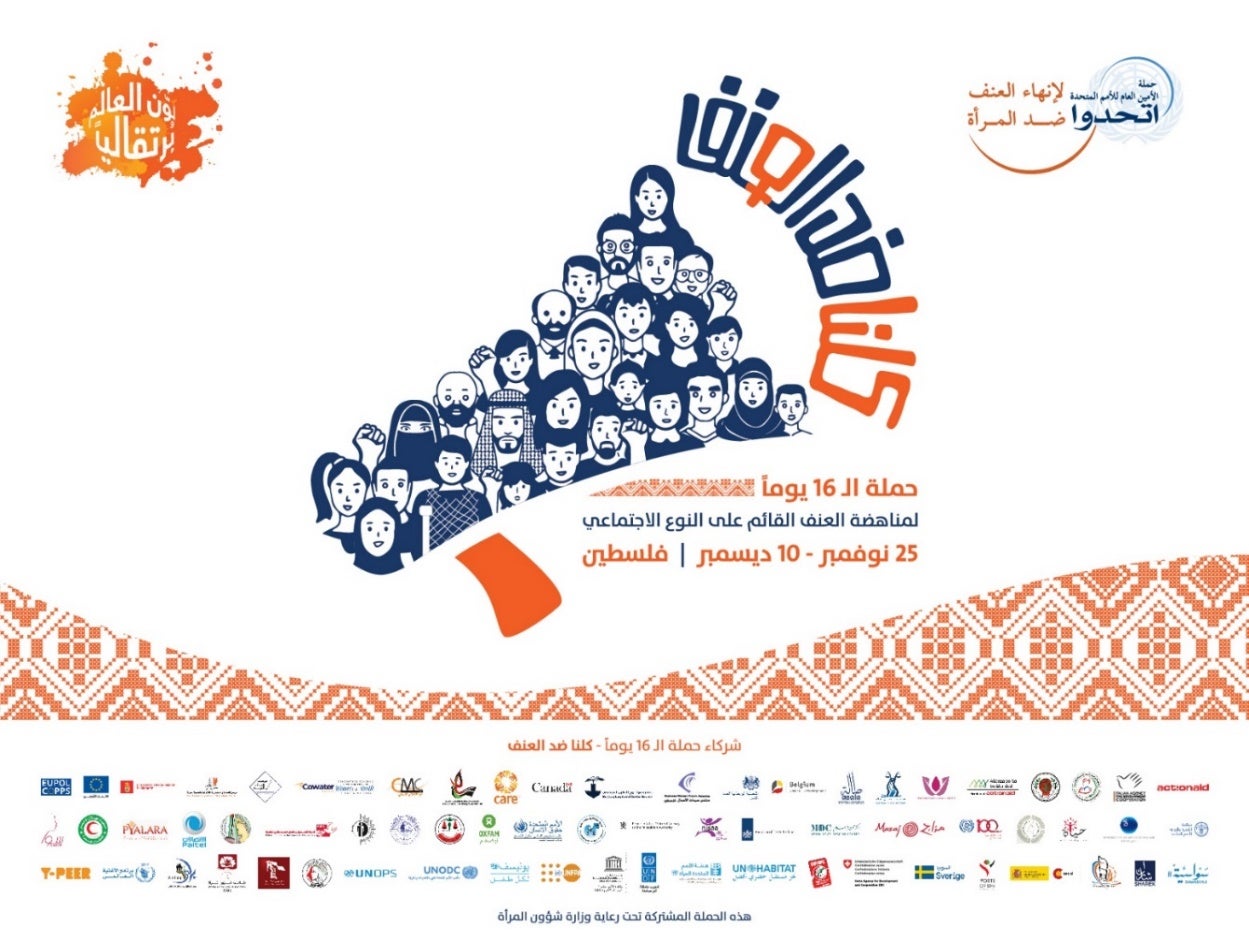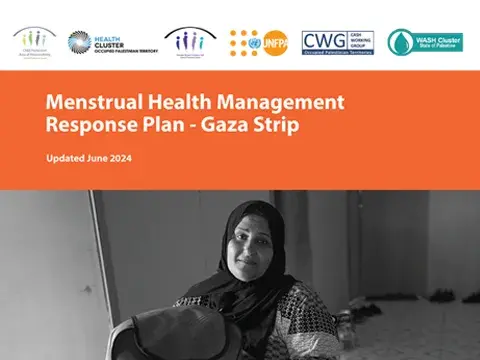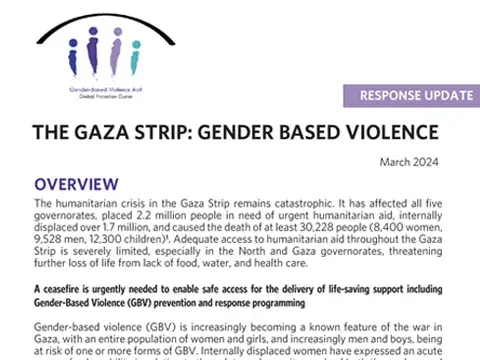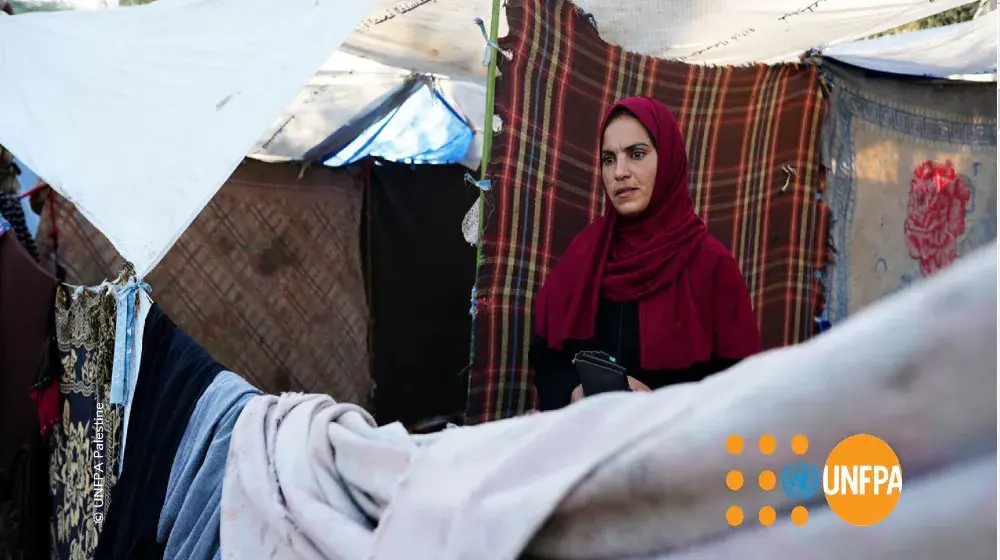For immediate release
Joint Press Release
Newly Launched “Together Against Violence” Joint Campaign Demands Prompt Adoption of Family Protection Bill and Better Access to Services for Gender-Based Violence Survivors in Palestine
Ramallah, 25 Nov 2019 – A 16-day joint campaign “Together Against Violence” was launched today, calling for prompt adoption of the Family Protection Bill and better access to services for gender-based violence (GBV) survivors. The campaign gathered a record-high of 68 national and international partners, which will roll out more than 100 coordinated activities throughout the West Bank, including East Jerusalem, and the Gaza Strip.
The joint campaign is part of the global solidarity movement, 16 Days of Activism against Gender-based Violence, and is further expanded from last year’s successful 16-day joint campaign in Palestine and the latest 2019 International Women’s Day joint campaign “My Rights, Our Power”. The latter involved over 30 partners to advocate for the adoption of the Family Protection Bill, regarded as the first step to prevent gender-based violence, protect survivors of gender-based violence, and hold the perpetrators accountable. The draft Bill, endorsed by the previous Cabinet at the end of December 2018, has not been passed yet, despite the high anticipation and demand from various national and international actors.
“This year’s 16 Days joint campaign, which grew three times in size from last year, clearly shows the aspiration of national and international actors in Palestine to see the actual adoption of the Family Protection Bill, after 15 years of rigorous push from the national women’s organizations and international actors supporting women’s rights,“ said one of the partners of the “Together Against Violence” joint campaign, referring to the case of Ms. Israa Ghrayeb, a 21-year-old woman from Bethlehem who died in suspicious circumstances caused by “torture and abuse,” creating enormous national and regional outcry demanding legal protection for women and girls subject to violence. According to the results of the National Violence Survey by the Palestinian Central Bureau of Statistics (PCBS) launched in November 2019, 29 per cent of women in Palestine experience a form of violence in her lifetime.
In addition, better access to services for the GBV survivors was put forward as the top GBV priority by the GBV Sub-Cluster in the Gaza Strip, especially for the women who have been affected by the Great March of Return and those with severe medical conditions such as cancer and kidney failure to name a few. Hemaya Network based in East Jerusalem, also highlighted the need for “alternative GBV services” for survivors of violence in East Jerusalem, owing to the Israeli occupation, which contributes to survivor’s negative experiences in GBV services and fears of being forcibly separated from their children by Israeli law enforcement. Awareness raising and behavior change, especially among youth and men, was also highlighted as another important objective of the campaign.
During the joint campaign period, over 100 coordinated on-site activities will be rolled out throughout Palestinian cities and villages, in the form of orange lightings, policy dialogues, youth camps, awareness raising sessions, film competitions, Ted-style talks, billboard displays, and cultural performances, while social media campaigns will reach audience online with messages against gender-based violence and useful information for survivors of violence in seeking legal, medical, psychosocial, and sheltering support. The “Orange the Sea” event, which lights 50 boats at the Gaza port to signal messages of solidarity and symbolize a bright and optimistic future of Palestine free from gender-based violence, will open the 16-day journey of the joint campaign this evening. The closing event of the joint campaign on 10 Dec 2019 will take place at An-Najah National University in Nablus, inviting more than 1,000 participants, including students and survivors of gender-based violence, to raise awareness on gender-based violence through cultural and music performances.
The 16 Days of Activism against Gender-Based Violence is a global solidarity campaign that takes place worldwide each year from 25 November, the International Day for the Elimination of Violence against Women, until 10 December, Human Rights Day. This year’s 16-day campaign coincides with a critical moment, only eight months before Palestine is requested to provide written information on the steps taken to implement four recommendations from the Concluding Observations of the Committee on the Elimination of All Forms of Discrimination against Women, which include the adoption of the Family Protection Bill and the publishing of the Convention on the Elimination of All Forms of Discrimination against Women (CEDAW) in the National Gazette. Palestine acceded to the CEDAW in April 2014 and following its submission of the CEDAW State Report, CEDAW Committee’s Concluding Observations were issued on 20 July 2018.
Violence against women and girls is a grave violation of human rights. The impact of violence has serious physical, sexual and mental consequences for women and girls. It negatively affects women’s general well-being, health, and prevents women from fully participating in society, while being detrimental to the entire family, the community, and the country at large.
The joint calendar of the “Together Against Violence” can be found here
For more information, please contact Eunjin Jeong at UN Women via eunjin.jeong@unwomen.org or 059 2321 308, Majd Beltaji at UNESCO via m.beltaji@unesco.org or 059 4501 506.
(END)
Annex 1. The list of “Together Against Violence” campaign partners
Annex 2. The official campaign logo
Annex 3. Key GBV Statistics in Palestine and globally
Annex 1. The list of “Together Against Violence” campaign partners
- ActionAid
- AISHA
- Al Ataa' Charitable Society
- Alianza por la Solidaridad
- Amal Coalition
- Asala
- Awn Access to Justice Network
- British Consulate General
- Burj Luq Luq Social Center Society
- Business Women Forum
- CARE International
- Center for Women's Legal Research & Consulting (CWLRC)
- Community Media Centre
- Consulate General of Belgium
- Consulate General of Sweden
- Cowater International/GROW Project
- Creative Women's Association
- Culture & Free Thought Association (CFTA)
- EU Representative Office
- EUPOL COPPS
- FAO
- Government of Canada
- HAYA Joint Programme
- Hemaya Network
- ILO
- Italian Agency for Development Cooperation
- Jawwal
- Mazaj Company for General Trading-BHCG
- Media Development Centre at Birzeit University
- National Society for Democracy and Law (NSDL)
- Nisaa FM
- OHCHR
- Oxfam
- Palestine Sports for Life
- Palestinian Bar Association
- Palestinian Center for Democracy and Conflict Resolution (PCDCR)
- Palestinian Center for Peace and Democracy (PCPD)
- Palestinian Centre for Human Rights (PCHR)
- Palestinian Developmental Women Studies Association (PDWSA)
- Paltel
- PYALARA
- Red Crescent Society for Gaza
- Representative Office of Denmark
- Representative Office of Finland
- Representative Office of Norway
- Representative Office of the Netherlands
- Sawa Organization
- Sawasya II Joint Programme
- Sharek Youth Forum
- South Women Media Forum
- Spanish Agency for International Development Cooperation/Spanish Consulate General
- Swiss Agency for Development and Cooperation
- The National Bank
- UNDP
- UNESCO
- UNFPA
- UN-Habitat
- UNICEF
- UN Women
- Union of Health Work Committees (UHWC)
- Union of Palestinian Women's Committees (UPWC)
- UNODC
- UNOPS
- Wefaq Society for Women and Child Care
- WFP
- Women's Affairs Center (WAC)
- Women's Affairs Technical Committee (WATC)
- Y-Peer
Annex 2. The official campaign logo

The official campaign logo of the “Together Against Violence” joint campaign, designed by a Nablus-based Palestinian designer Majd Assali, who won the campaign logo competition, organized by the Office of the EU Representative Office in September 2019 to encourage young artists to participate in the nation-wide efforts to end gender-based violence.
Annex 3. Key GBV Statistics in Palestine and globally
Palestine
I. Statistics on GBV within the household
According to the results of the National Violence Survey launched in November 2019 by the Palestinian Central Bureau of Statistics (PCBS):
- The average of 29 per cent of the currently married or ever married women in Palestine experienced at least one form of violence (such as psychological, physical, sexual, social or economic violence) by their husbands in Palestine (38 per cent in the Gaza Strip and 24 per cent in the West Bank).
II. Men’s perceptions on GBV
According to the results of the International Men and Gender Equality Survey (IMAGES) Palestine Report launched in February 2018 by UN Women:
- 63 per cent of Palestinian men agreed that a woman should tolerate violence to keep the family together;
- 1 in 4 Palestinian men reported witnessing their mother being beaten by their father or a male relative during their childhood;
- 17 per cent of Palestinian men said that they had ever perpetrated an act of physical violence against woman partner.
III. Access to Services for GBV Survivors
According to the results of the National Violence Survey launched in November 2019 by the Palestinian Central Bureau of Statistics (PCBS):
- Only 28 per cent of currently married or ever married women in the Gaza Strip who experienced a form of violence reported that they were aware of the existence of centers of institutions for protection against violence in the region, locality or governorate in which they live, while 49 per cent were aware in the West Bank.
- 66.9 per cent of women in the Gaza Strip who experienced violence by their husbands chose to remain silent and told no-one about it, while only 1.8 per cent headed to a psychosocial or legal assistance center; 55.5 per cent remained silent in the West Bank and 1.1 per cent headed to a psychosocial or legal assistance center.
Global
I. Violence Against Women and Girls
- It is estimated that 1 in 3 women worldwide have suffered either physical and/or sexual intimate partner violence or sexual violence by a non-partner.
- In 2017, an estimated 58 percent of all female victims of intentional homicide were killed by a member of their own family, amounting to 137 women killed each day.
- In the majority of countries with available data, less than 40 per cent of the women who experience violence seek help of any sort.
II. Laws on Ending Violence Against Women and Girls
- At least 144 countries have passed laws on domestic violence, and 154 countries have laws on sexual harassment. However, even when laws exist, this does not mean they are always compliant with international standards and recommendations or implemented.
III. Child Marriage
- It is estimated that there are 650 million women and girls in the world today who were married before age 18. During the past decade, the global rate of child marriage has declined.
- Child marriage often results in early pregnancy and social isolation, interrupts schooling, limits the girl’s opportunities and increases her risk of experiencing domestic violence.




